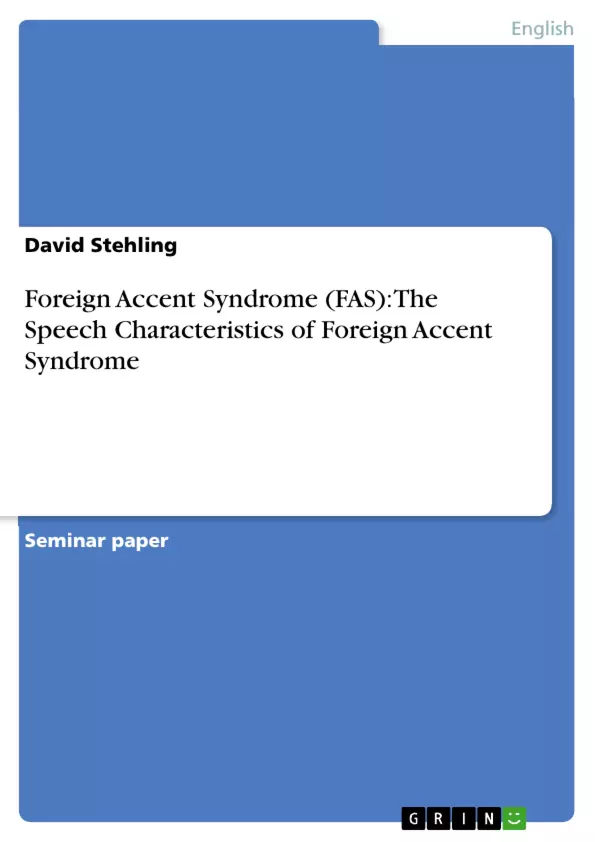After a brain injury, e.g. a stroke, areas of the brain can be damaged permanently. Thus, a lesion on the brain can have long-term consequences for the concerned person, such as paralyses, decreased reflexes, altered sensory perception, memory deficits, and/or speech and comprehension impairments. The latter may include aphasia (i.e. affection of Broca’s or Wernicke’s area causing an inability to produce or comprehend language), apraxia (impairment of voluntary movements), or foreign accent syndrome (also known as altered-accent syndrome).
The foreign accent syndrome (FAS) is a disorder that is still not completely researched, since, according to Katz et al. (2008: 537), its “symptomotology and underlying bases are poorly understood.” Nevertheless, there are some cases that have been described and examined. This essay deals with the main speech characteristics of FAS and the relative extent to which segmental and prosodic features are affected in this disorder. Therefore, the syndrome will be defined and described first. In the succeeding section, the segmental and prosodic features of FAS are taken into consideration. The last part contains the classification of FAS with respect to other speech and language disorders, such as apraxia, aphasia, and dysarthria, whether it is a mere sub-type of these disorders or if it should be treated separately.
Inhaltsverzeichnis (Table of Contents)
- Introduction
- General Background
- Underlying Phonetic Alterations
- Segmental Alterations
- Prosodic Alterations
- Categorisation
- Summary
Zielsetzung und Themenschwerpunkte (Objectives and Key Themes)
This essay aims to describe the main speech characteristics of Foreign Accent Syndrome (FAS) and the relative extent to which segmental and prosodic features are affected in this disorder. The essay will define and describe the syndrome, then discuss segmental and prosodic features of FAS. Finally, it will address the classification of FAS in relation to other speech and language disorders.
- Definition and description of Foreign Accent Syndrome (FAS)
- Analysis of segmental and prosodic features affected in FAS
- Classification of FAS in relation to other speech and language disorders
- Exploration of the neurological basis of FAS
- Examination of the perception of FAS by listeners
Zusammenfassung der Kapitel (Chapter Summaries)
Introduction: This chapter introduces the concept of Foreign Accent Syndrome (FAS) as a neurological impairment affecting speech after brain injury. It highlights the limited understanding of its symptomology and underlying causes. The chapter outlines the essay's focus on analyzing the speech characteristics of FAS, particularly segmental and prosodic alterations.
General Background: This chapter provides a broader context for FAS, defining it as a rare neurological impairment that can occur after a stroke or other brain injuries. It discusses the perception of the patient's speech as "foreign" by listeners, despite the lack of actual exposure to the perceived language or dialect. The chapter also explores the potential causes of FAS, including traumatic brain injury, multiple sclerosis, and schizophrenia, while emphasizing the difficulty in pinpointing a specific neural area responsible for the disorder.
Underlying Phonetic Alterations: This chapter delves into the specific phonetic changes observed in patients with FAS. It highlights the predominance of prosodic alterations, while acknowledging the occurrence of segmental errors. The chapter examines variations in vowels, including diphthongization, tension, weakening, laxing, lengthening, shortening, and changes in place of articulation. It also discusses consonant alterations such as substitutions, cluster simplification, voicing errors, and strengthening or weakening of consonants.
Segmental Alterations: This chapter explores the specific segmental alterations observed in FAS, focusing on vowel and consonant changes. It highlights the difficulty in identifying consistent patterns across patients, with variations in vowel realization and consonant alterations making it challenging to define a characteristic alteration pattern for FAS. The chapter concludes by emphasizing the predominance of prosodic alterations in causing the impression of a foreign accent.
Prosodic Alterations: This chapter examines the prosodic features of FAS, acknowledging the significance of stress, rhythm, and intonation in conveying the impression of a foreign accent. It emphasizes the prevalence of prosodic disturbances in most cases of FAS, suggesting that dysprosody plays a crucial role in the perception of foreignness.
Schlüsselwörter (Keywords)
Foreign Accent Syndrome, speech characteristics, segmental alterations, prosodic alterations, neurological impairment, brain injury, stroke, dysprosody, accent perception, speech perception, classification, apraxia, aphasia, dysarthria, neural basis, language disorders.
- Citation du texte
- David Stehling (Auteur), 2009, Foreign Accent Syndrome (FAS): The Speech Characteristics of Foreign Accent Syndrome, Munich, GRIN Verlag, https://www.grin.com/document/205524



